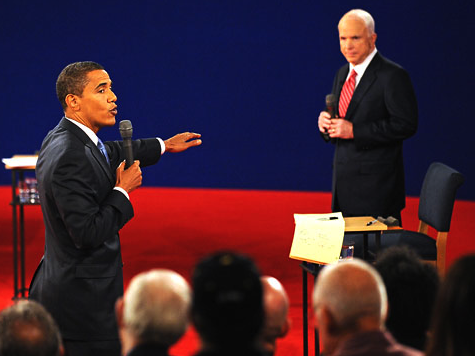In 1980, Governor Ronald Reagan won the sole debate with incumbent President Jimmy Carter–and won the election a week later. The media won’t let that happen again.
And so President Barack Obama will “win” next month’s debates–not because he is a better debater than Governor Mitt Romney, but because of media bias. If Romney hopes to build an advantage in the closing weeks, he will have to find another way.
The media’s behavior fits a predictable pattern. Irregardless of what Obama actually does, they either declare him the winner, or say that he surpassed expectations. That, in turn, convinces significant numbers of people that Obama has, in fact, won. When that turns up in a favorable poll bump for Obama, the media reports the result as a wholly independent development, neglecting to report their role in priming the polling pump.
We have seen this pattern most recently in the coverage of the Democratic National Convention, where a lackluster speech by Obama and an embarrassing floor fight over God and Jerusalem somehow generated a nice bounce for the president.
A particularly extreme case was the 2008 Vice Presidential debate, where Gov. Sarah Palin trounced Sen. Joe Biden and beat expectations–but the media still declared him the winner.
Often the moderators themselves have chosen sides, and this year is no different. In 2008 it was PBS’ Gwen Ifill, who was writing a book about Obama at the time she sat down to referee the Vice Presidential debate. This time around, CNN’s Candy Crowley was announced as the moderator for the second presidential debate, shortly after she had mocked Romney’s running mate, Paul Ryan, calling them the “death wish ticket.”
In addition to these structural advantages, Obama has debating talent and experience. Erin Edmonds, a law school classmate, told Breitbart News in an interview earlier this year that she had burst into tears when she learned that she would be up against Obama in the moot court competition. “[O]f 550 people in that first-year class at Harvard Law School, there was exactly one person whom no one wanted to draw,” she recalled.
Obama got an early start in high school, when he won a debate on gun control–taking the gun-rights side of the argument, according to David Maraniss’s recent biography of the president. Obama’s opponent, Jeff Cox, recalled that he “went into it in traditional fashion, preparing facts to lay out, one argument after another…”. But Obama won by “bouncing all over the place,” and making arguments at a “ten-thousand-foot level.” As Cox recalled, he “was annoyed. He felt that he had followed debate procedures and Barry [Obama] had danced around them.” But “the teacher loved it.”
It was not the last time Obama would win a debate by bending the rules. Obama’s favorite debating trick is to demand more time when an opponent makes a point at his expense–conveying, at the same time, that his opponent has done something wrong that requires redress.
(When Obama loses, the media claims his opponent has broken the rules–as it did in the Saddleback debate of August 2008, where the candidates appeared separately onstage. The New York Times made the false suggestion that McCain had cheated by listening in to Obama’s answers before it was his turn to appear. The evidence? McCain was not in a literal “cone of silence” during Obama’s question-and-answer session.)
Obama’s tactics reflect a strategic understanding of how debates work that Republicans have not mastered yet. Obama does not come to debates to argue with his opponent, but to deliver a pre-packaged message. That technique is commonly taught to left-wing pundits by Media Matters for America, and is best exemplified in the appearances of such surrogates as Democratic National Committee chair Debbie Wasserman Schultz.
Wasserman Schultz is often mocked–even by CNN–for sticking to her talking points, but there is a reason she does it. Many people today obtain their news through partisan sources and social media. These tend to excerpt and amplify only those portions of an interview or debate that drive the partisan message forward. So a disastrous TV performance on debate night can become a win the day after–at least to the target audience.
Obama also knows that the media’s new battalions of “fact-checkers” tend to push back in debates against Republican arguments while amplifying Democratic talking points. So Obama will arrive at the debates with fewer nerves–and leave with less criticism in his wake.
In sum, Romney will have to do far more than simply outperform Obama to use the debates as a springboard. He would do well to look elsewhere for a late bounce.

COMMENTS
Please let us know if you're having issues with commenting.